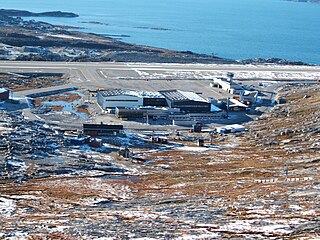
The transportation system in Greenland is very unusual in that Greenland has no railways, no inland waterways, and virtually no roads between towns. Historically the major means of transportation has been by boat around the coast in summer and by dog sled in winter, particularly in the north and east. Nowadays air travel, by helicopter or other aircraft, is the main way of travel.

Monopoly is a multiplayer economics-themed board game. In the game, players roll two dice to move around the game board, buying and trading properties and developing them with houses and hotels. Players collect rent from their opponents and aim to drive them into bankruptcy. Money can also be gained or lost through Chance and Community Chest cards and tax squares. Players receive a salary every time they pass "Go" and can end up in jail, from which they cannot move until they have met one of three conditions. House rules, hundreds of different editions, many spin-offs, and related media exist. Monopoly has become a part of international popular culture, having been licensed locally in more than 103 countries and printed in more than 37 languages. As of 2015, it was estimated that the game had sold 275 million copies worldwide. The original game was based on locations in Atlantic City, New Jersey, United States with the exception of Marvin Gardens.
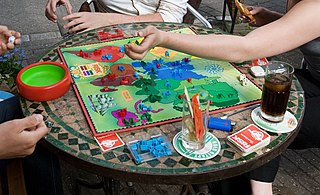
Risk is a strategy board game of diplomacy, conflict and conquest for two to six players. The standard version is played on a board depicting a political map of the world, divided into 42 territories, which are grouped into six continents. Turns rotate among players who control armies of playing pieces with which they attempt to capture territories from other players, with results determined by dice rolls. Players may form and dissolve alliances during the course of the game. The goal of the game is to occupy every territory on the board and, in doing so, eliminate the other players. The game can be lengthy, requiring several hours to multiple days to finish. European versions are structured so that each player has a limited "secret mission" objective that shortens the game.
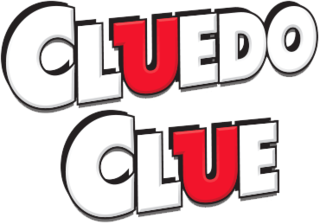
Cluedo, known as Clue in North America, is a murder mystery game for three to six players that was devised in 1943 by British board game designer Anthony E. Pratt. The game was first manufactured by Waddingtons in the United Kingdom in 1949. Since then, it has been relaunched and updated several times, and it is currently owned and published by the American game and toy company Hasbro.

Air Canada Flight 143, commonly known as the Gimli Glider, was a Canadian scheduled domestic passenger flight between Montreal and Edmonton that ran out of fuel on Saturday, July 23, 1983, at an altitude of 41,000 feet (12,500 m), midway through the flight. The flight crew successfully glided the Boeing 767 to an emergency landing at a former Royal Canadian Air Force base in Gimli, Manitoba, which had been converted to a racetrack, Gimli Motorsports Park. It resulted in no serious injuries to passengers or persons on the ground, and only minor damage to the aircraft. The aircraft was repaired and remained in service until its retirement in 2008. This unusual aviation incident earned the aircraft the nickname "Gimli Glider."

Operations Black Buck 1 to Black Buck 7 were seven extremely long-range ground attack missions conducted during the 1982 Falklands War by Royal Air Force (RAF) Vulcan bombers of the RAF Waddington Wing, comprising aircraft from Nos. 44, 50 and 101 Squadrons, against Argentine positions in the Falkland Islands. Five of the missions completed attacks. The objective of the missions was to attack Port Stanley Airport and its associated defences. The raids, at almost 6,600 nautical miles and 16 hours for the round trip, were the longest-ranged bombing raids in history at that time.
In tabletop games and video games, game mechanics are the rules or ludemes that govern and guide the player's actions, as well as the game's response to them. A rule is an instruction on how to play, a ludeme is an element of play like the L-shaped move of the knight in chess. A game's mechanics thus effectively specify how the game will work for the people who play it.
A Game of Thrones is a strategy board game created by Christian T. Petersen and published by Fantasy Flight Games in 2003. The game is based on the A Song of Ice and Fire series of high fantasy novels by George R. R. Martin. It was followed in 2004 by the expansion A Clash of Kings, and in 2006 by the expansion A Storm of Swords.
Aladdin's Dragons is a 2000 bidding-based board game by Richard Breese. It is a reimplementation of his 1998 game Keydom.
Devil Bunny Needs a Ham is a board game by Cheapass Games for 2-4 players. In the game, sous-chefs try to climb up a building while Devil Bunny attempts to knock them off in the mistaken belief that doing so will get him a ham.

Primordial Soup is a board game designed by Doris Matthäus & Frank Nestel and published by Z-Man Games. It was first published in 1997 in Germany by Doris & Frank under the name Ursuppe and this original version won 2nd prize in the 1998 Deutscher Spiele Preis.

Dune is a strategy board game set in Frank Herbert's Dune universe, published by Avalon Hill in 1979. The game was designed by Bill Eberle, Jack Kittredge and Peter Olotka. After many years out of print, the game was reissued by Gale Force Nine in 2019 in advance of the 2021 Dune film adaptation.
StarCraft: The Board Game, published by Fantasy Flight Games, is a game inspired by the 1998 computer game StarCraft. Players take control of the three distinctive races featured in the video games, the Terrans, the Protoss, or the Zerg, to engage in battle across multiple worlds in order to achieve victory. Each of the three races features a fairly different playing style. A prototype of the game was shown in BlizzCon 2007, with pre-release copies sold at Gen Con 2007 and Penny Arcade Expo 2007. It was publicly released in October 2007.

Starfarers of Catan is a multiplayer board game loosely based on the Settlers of Catan series of games. It was created by Klaus Teuber as an official spin-off and is distributed by Kosmos in German and Mayfair Games in English.
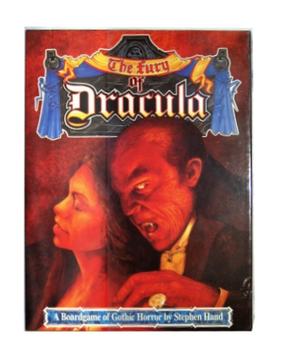
The Fury of Dracula is a board game for 2-4 players designed by Stephen Hand and published by Games Workshop in 1987. Fantasy Flight Games released an updated version in 2006 as Fury of Dracula, and a third edition in 2015 by the same name. WizKids Games released a fourth edition in 2019.
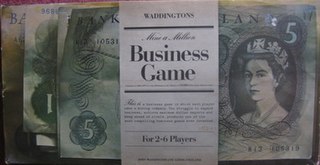
Mine a Million or The Business Game is a 1965 board game for 2-6 players previously published by Waddingtons. The game models the economic business of mining tin and gaining profit by transporting it to markets. The "million" in the game's title refers to the target profit players must reach.
Fractional ownership of aircraft is an arrangement in which multiple owners share the use and costs of purchasing and operating an aircraft. Several management companies provide fractional ownership programs for aircraft, including NetJets, Flexjet, Volato, PlaneSense, and AirSprint. Alternatively, owners can join together to purchase their aircraft, independently of a larger management company.

Bosworth is a four-handed chess variant manufactured by Out of the Box Publishing company since 1998. It is played on 6x6 board and uses 4 sets of standard chess pieces.

RoboRally is a board game for 2–8 players designed by Richard Garfield and published by Wizards of the Coast (WotC) in 1994. Various expansions and revisions have been published by both WotC and by Avalon Hill.
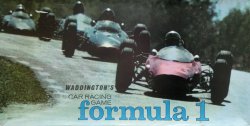
Formula 1 is a motor racing themed board game designed by John Howarth and Trevor Jones and originally published by Waddingtons of Leeds, United Kingdom in 1962.















